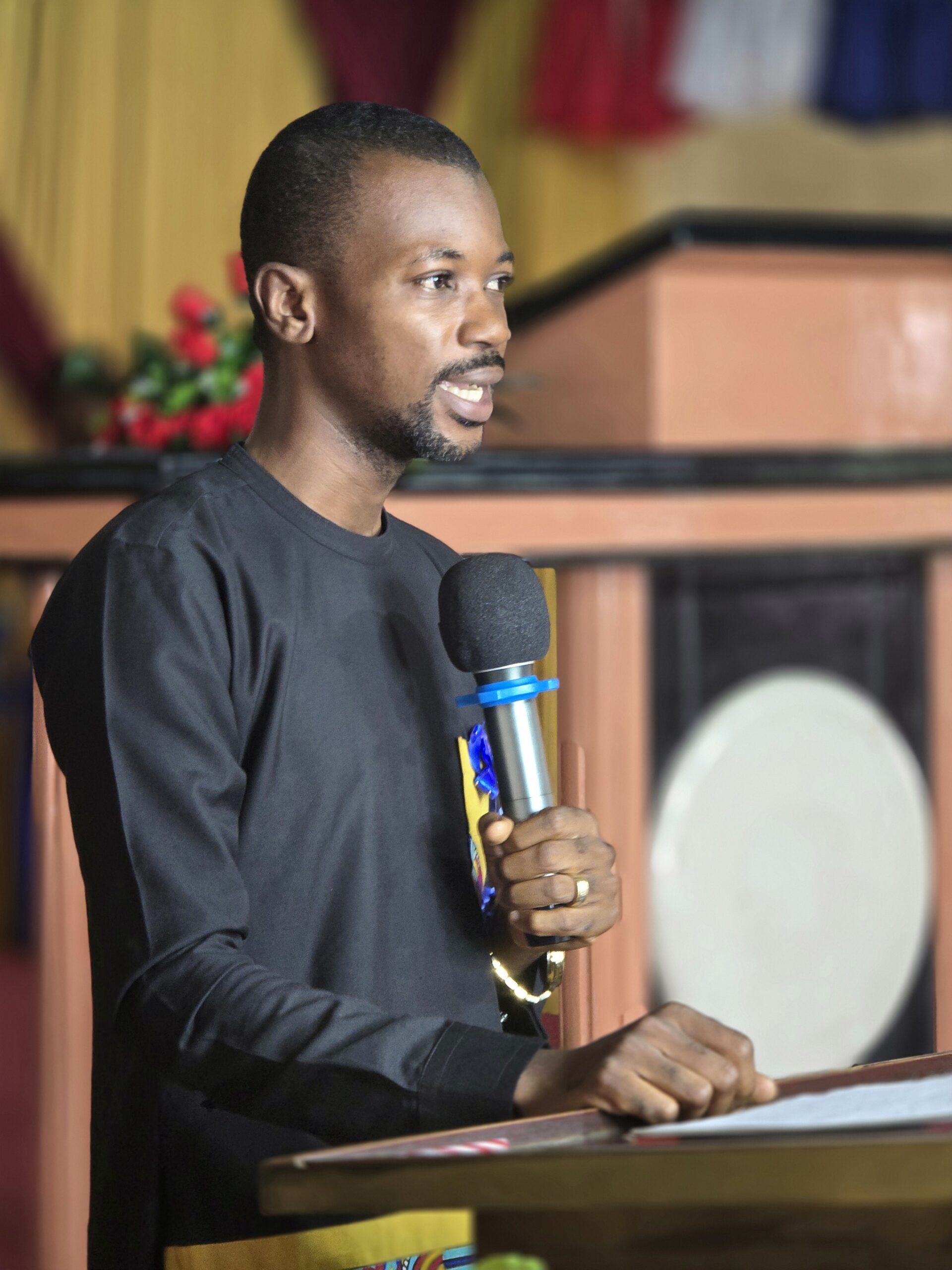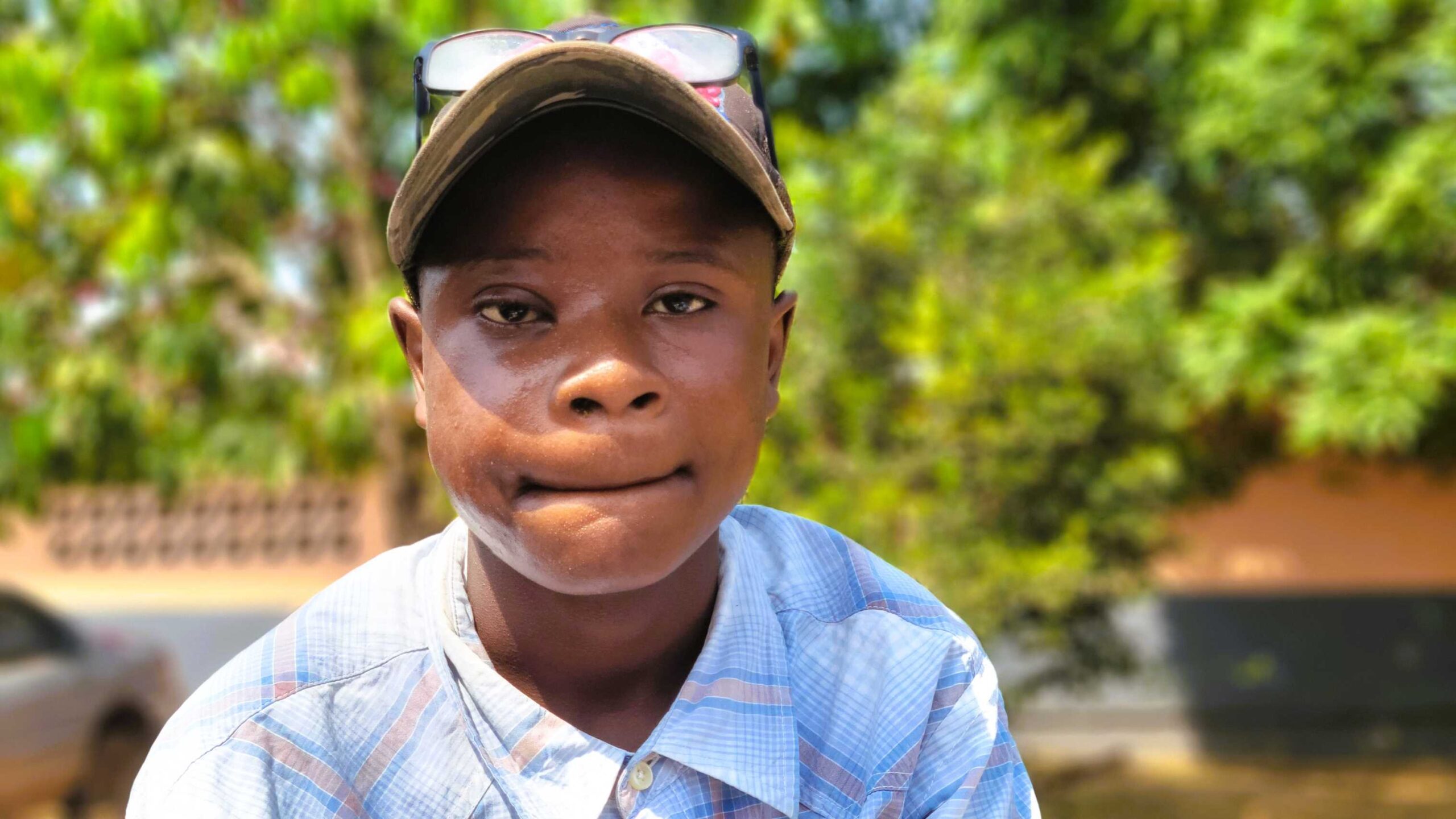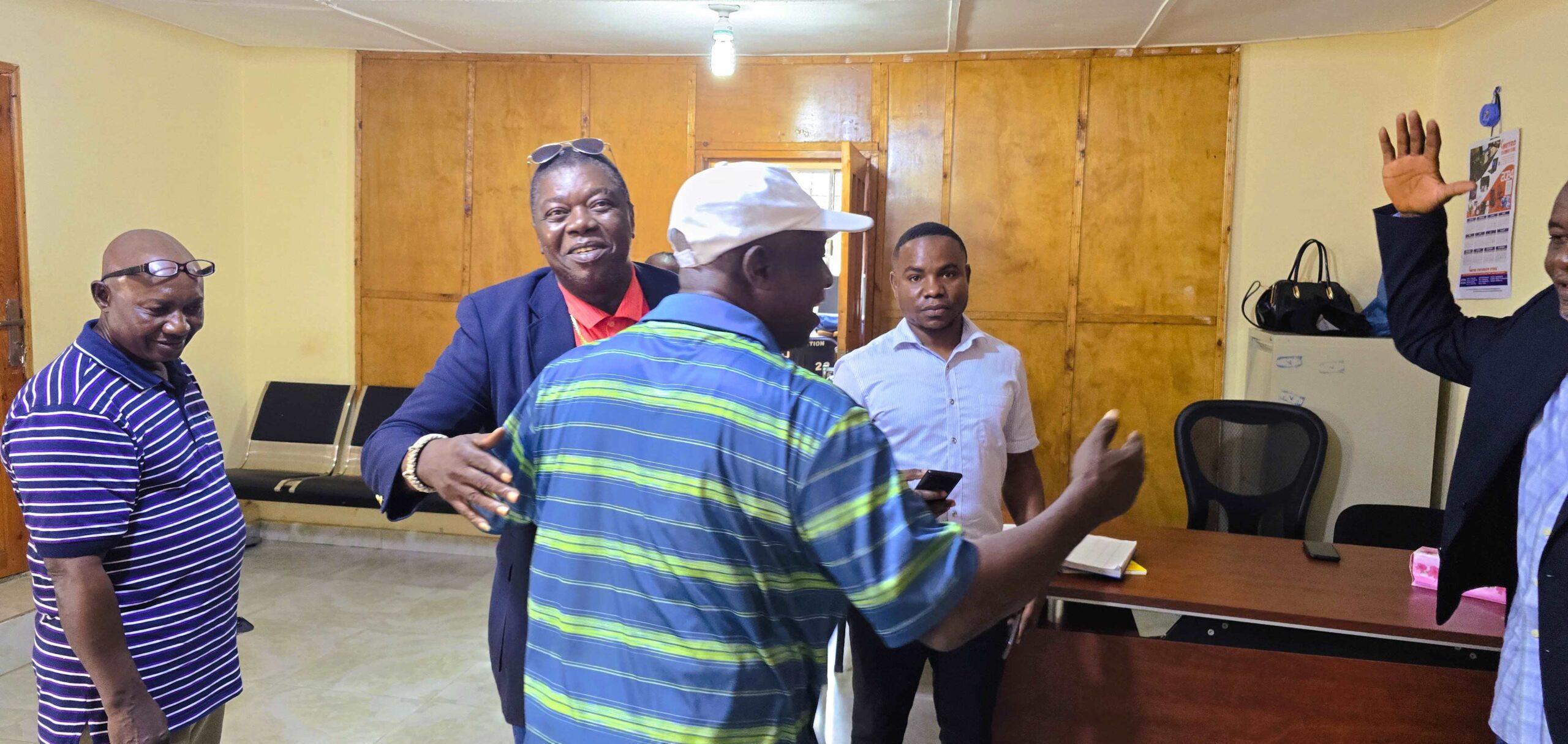New Cultural Amb. Kekura Kamara, receives cheers at JNB Foundation HQs; the tasks before him
In this special report, Global Ekklesia’s Editor-Publisher, James Kokulo Fasuekoi, attempts to chronicle Kamara’s artistic life as a career actor, filmmaker and a journalist, as well as some of the tough challenges ahead of him as Liberia’s Ambassador for Culture & Arts.

On a recent Friday afternoon, shouts ran out at the Joseph N. Boakai Foundation, a charity center in the Paynesville’s Rehab Community, as Liberia’s designated Cultural Ambassadors, Kekura Mohammed Kamara made an impromptu visit to the foundation to greet its staffers.
Amb. Kamara said he had been running errands in the area when he decided to stop and greet the foundation’s boss Mr. Jackson K. George along with his staff. Mr. George wasn’t present, but the staff warmly welcomed Kamara. This was his first visit following his recent appointment as Ambassador of Liberian Culture.

He had visited the foundation’s headquarters first in June, to greet this writer who happens to be his best friend who acted and danced with Mr. Kamara in the 80s, the time both were members of the private Liberian Cultural Ambassadors Dance Troupe (LCADT).
About a dozen staffers rushed into the conference room as soon as it was announced Mr. Kamara was in the house. Staff at the charity, many of whom had been fans of Kamara’s iconic Malawala-Balawala television drama series of the 1980s, soon assembled and warmly greeted him.
Amid heavy laughter and cheers they took turns congratulating him for the new post. “We are happy for you,” one remarked. Another said, President Boakai’s choice of him seemed quite thoughtful and timely indeed.

A third, reaching out for a handshake observed: “I could see this coming,” an apparent reference to Kamara’s selection.
How Juli Endee got the post
Amb. Juli Endee’s long years of service came under serious scrutiny early this year-in part due to what some fans viewed as her partial way of conducting business throughout the nearly 28 consecutive years she served in the post before being relieved.
The title had been conferred upon Endee by the office of Chief Tamba Taylor-then a member of the Six-Men Council Presidency-in 1996, after Endee’s “Liberia Cry for Peace” group’s disarmament campaign across the country, and not by Charles Taylor, or interim Pres. Cllr. David Kpormakpor, as previously stated by MICAT’s boss Jerolinmek Piah and Journalist Moses Sande.
Until Juli Endee’s arrival to Liberia around 1994-95, only a “Sports Ambassador” post existed; there was no such title as “Liberia Cultural Ambassador.” It was Madam Endee who, together with this writer, Journalists Moses Sande and Willie Bower, and the Cry for Peace dance group that worked so hard and created the post before “title” was given to Endee.
Who’s Kekura Kamara?
What most people, especially this present generation may not know about the designated ambassador, is that he’s a journalist in his own rights and previously worked at MICAT Television for decades prior to the war, later editing and-producing his own TV program called, “The Reflection.”

A Liberian of Mandingo origin from Lofa County, Kekura Kamara or “Malawala-Balawala” remains a household name throughout the country and beyond. He’s not only a career-actor and a sensational ballet dancer, but he’s also a national filmmaker and a playwright, who founded and produced the Malawala-Balawala TV comedy series aired weekly on national television.
A 1983 graduate of the University of Liberia, Kamara holds a bachelor of Science degree in Economics with a Minor in Sociology. He received multiple training in Cinematography at the Ministry of Information Cultural Affairs and Tourism (MICAT) from 1977-1985.
In an exclusive telephone interview with Global Ekklesia Kamara said his cultural career began after he first joined the erstwhile “Jungle Dance Troupe” founded 1974 at William V.S. Tubman High School in Monrovia. The school dance troupe, with the help of Pres. William Tolbert traveled to America in 1974, and later, in 1978, after which Tolbert named it “Liberian Cultural Ambassadors.”

In 1996, while still a refugee residing in the Ivory Coast, he and Liberia’s folksinger Fatu Gayflor traveled to Milan, Italy where both participated in a peace concert called the 1st World Rhythm Festival. It was organized and sponsored by then soccer star, Mr. George Weah who would later become president of Liberia.
Amb. Kamara is also the recipient of ACANA’s 2009 Cultural Excellence Award. ACANA is the African Cultural Alliances of North America, an international arts organization, headquartered in Philadelphia, USA and headed by Liberian businessman, Mr. Voffee Jabateh.
Kamara belongs to a family of entertainers, especially in creative arts; his late elder brother, Hon. Jallah K.K. Kamara, for instance, was himself a cultural artist at one time when he lived and studied in Europe. Mr. Jallah Kamara was first director for National Cultural Bureau of Liberia after the bureau’s first creation in early 1982 by the P.R.C. government of late Pres. Samual K. Doe.
Division among arts fans
Kamara comes to the fold with a wealth of experience in show business, particularly musical-cultural performance and arts. His selection comes after a period of intense social media bickering among arts lovers over who should occupy the “ambassador” post, with some calling for Endee’s removal.
The squabble caused division among musical-cultural artists themselves as well as journalists in the country with one group opposing Endee’s administration while the other supported her. Most of Endee’s opponents appear concerned over the seemingly deteriorating cultural/arts trend of the nation in recent decades.

In one particular case for instance, a man reported to be of Nimba-Dahn origin (as Endee herself), previously with a huge social media following, scourged the ex-cultural diplomat this year in a series of video posts, calling her “names” and desecrating womanhood in general.
Amb. Endee responded by rallying women groups in the country, and together they dragged the so-called “defendant” to court and demanded justice. Like a Doomsday “prophet,” the woman’s abuser made a big show of his appearance to court, marching through a jubilating crowd of supporters and waving an animal tail.
Avoidance of ‘conflict of interest’
Apparently aware of Endee’s shortcomings which dragged her reputation into the mud, Kamara did something different right after his appointment; he announced his resignation from all other group engagement, including his private Malawala-Balawala dramatic group founded 1988.
Kamara [has] “announced his resignation from [all] previous roles, including president of the Cultural Union of Liberia and Executive Director of Balawala, underscoring his commitment to serve all cultural organizations and societies equally,”(The Inquirer of August 23, 2024). It was to avoid similar controversy Endee created around her 28 years leadership as ambassador for culture.
Endee, as national cultural ambassador, comfortably ran her own private group, “Liberia Crusaders for Peace,” she founded about 27 years ago, replacing “Liberia Cry for Peace,” the first she organized 1995. Cry for Peace dissolved in 1997, after Endee took the group to the USA for a festival and got stranded there due to poor arrangement and management (The Inquirer, Thursday, April 24, 1997, Page 4/J. Fasuekoi).

Also, in 2012, during former President Ellen Sirleaf’s “VISION 2030” national conference in Gbarnga and Bentol, only Madam Endee’s Crusaders performed. This trend continued through the Weah’s administration, denying some 35 or more national ballet and musical dance groups including the National Cultural Troupe, formerly of Kendeja from participating.
It remains unclear whether MICAT ever pressed Endee to conduct an audition (a standing tradition until Endee’s appointment), prior to the “Dubai Expo 2020” trip, for instance. It’s still not clear if dancers, drummers, singers and actors from other local groups, other than members of Endee’s private “Crusaders for Peace” made it to the Dubai Festival.
In addition, it has long been speculated that most contracts from the GOL and foreign NGOs pertaining to mass awareness campaign on the Ebola-COVID-19 epidemics of 2014, 2019, or the so-called “Female Genital Mutilation” (FGM) which would normally be distributed among entertainment groups in Liberia now went only to Endee’s Crusaders.
Most artists, therefore, fearing reprisal from Endee, preferred to remain silent or speak secretly about these matters; and it’s such issues this writer sought to discuss with Endee, prior to her replacement by Head of State Amb. Joseph N. Boakai Sr., but a proposed meeting between her and this writer failed.
The ascendency to the parliament of CDC Rep. Munah Pelham-Youngblood, once a supermodel & artist, raised high hopes among artists. They thought she would address these existing “conflict of interests” which proved detrimental to cultural growth. Rep. Munah however failed to meet their expectations.
Challenges before Amb. Kamara
But the Juli Endee issue may just be a fraction of the bigger problem out there. The biggest and perhaps, the most difficult task Kamara faces is how his office will deal with the emerging cultural war from Western nations, or navigate it as Endee did for nearly three decades. It’s the fight to abolish Sande practice in the country, while replacing it with strange cultures such as Gay & Lesbianism.

With little or no knowledge about Sande Culture, it’s very interesting how certain powerful nations have unfairly used power, influence and taxpayers’ monies, and the mass media to demonize Sande practices particularly in Africa, although the same culture is widely practiced in Middle Eastern nations and also Australia.
It must be noted that some African immigrant women, according to research, also practice “FGM” but secretly in the Western world, nevertheless anti-FGM campaigners and sponsors continue to ignore this fact for decades now but remain bias toward African women due to their economic and social status.
In their campaign, the same “powerful” have funded local media entities purporting to fight for “women’s rights” and “justice” in Africa. The New Narratives? The truth, in the minds of traditionalists, is, their action now raises questions about African Women’s right to “Choose” and at the same time, it reveals their utter prejudice of marginalization and discrimination against these very “African women” they claim to be “protecting.”
To make things look as if Liberians themselves are the ones denouncing and fighting to abolish the Sande Colleges in the country, foreign nations with vested interest in Liberia, have used fundings, establishing proxy anti-FGM “media groups” for both male and female reporters with one dubbed as “journalist against harmful traditional practices.”
NGOs like “ActionAid-Liberia” and the “UN Women,” i.e., in the business of promoting Gay and Lesbian cultures, in total disregard for Liberia’s Indigenous Cultural Values, are said to have heavily funded Endee’s anit-FGM campaigns across Liberia during the past decades. While this went on, they reportedly funded, or attempted to fund anti-FGM legislation bills during both Sirleaf’s and Weah’s regimes: purpose? Fight to create the basis for the state recognize Sande practice as a “Violent crime against women” and have doers drastically penalized if caught in the act!
Fortunately, Endee and her “Crusaders” were at the forefront of such discriminatory campaign against Liberian women. On November 3, 2023, i.e., she made a big spectacle in the Kpelle Town of Gboata, near Gbarnga; there, she, and the “UN Women” group, as well as chiefs, representatives of the Interior and Gender-Protection Ministries, demanded hundreds of Sande Women to surrender their “operational tools,” thus marking an end to a century old cultural practice.
No Word of God; No Holy Bible
In the real world, the most reasonable move any good people would do in such a situation (first ever in history), would be to first preach Jesus Christ to the converting Sande Women and give each the Holy Bible but strangely, no one did so at this elaborate ceremony in Gboata.
A Global Ekklesia contributor attending the ceremony described how a group of women shed tears as they turned-over their “operation tools” amid vague promises with no assurance for compensation from the “UN Women and others, in return. Our correspondent responded in the negative when repeatedly asked by writer whether Endee, (believed to belong to Sande background), ever preached the WORD of God, or distributed Holy Bibles to the Sande Women.
At a national ALJA Journalist forum in Minneapolis, Minn., 2019, Amb. Endee received applause from retired and active reporters when she argued homosexuality (Gay & Lesbianism) had no place in Liberia; that neither GOL nor the national legislature would ever endorse such practices, citing cultural factors as the reason why.
Yet, Endee, a Christian, has never addressed nor condemn the widespread practices and promotion of homosexuality in the country by anti-FGM groups, including Action-Aid Liberia and local anit-FGM-media groups: this apparently left many questions about her own role in a nation with 16 indigenous groupings, each with its own distinct cultures and traditions.
As of the time of this writing, the voices of millions of African women in general were being suppressed by foreign governments, with the help of the mass media within their various localities. The women and girls were also being denied the right to make decisions about their “bodies,” the same “right” women and girls, living in places such as America, Canada, and Sweden freely enjoy daily.
Hence, some critical and fair-minded individuals from Liberian African indigenous background think this is absolutely an unjust treatment toward millions of Sande African women-most of whom are illiterate and unable to press for their own rights.
However, whatever strategy Amb. Kamara might use in order to resolve such negative impression being created about African Women of Sande background, remains to be seen.
Editor’s Note: Documentary writer and news photographer, James Fasuekoi is an expert and custodian of Liberian civil war history, cultures & traditions and the performing arts. An artist himself, Fasuekoi and Mr. Kamara danced and acted with the Liberian Cultural Ambassadors Dance Troupe during the 80s. He’s a friend of both Juli Endee and Mr. Kekura Kamara.











